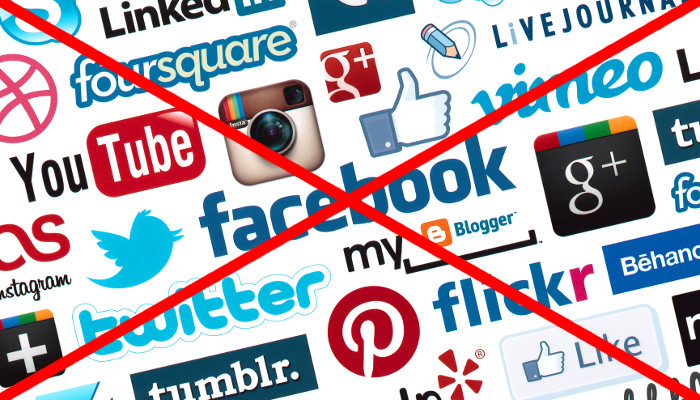Kashmir social media ban leaves journalists, students and patients clueless about their future

By Raqib Hameed Naik, TwoCircles.net
Srinagar: Inside the two-storey building of RISE institute in Jawahar Nagar, Srinagar, which provides coaching for various competitive examinations, one of its faculty, Imbesat Ahmed is trying to figure out ways to communicate the timings of classes with the students in the backdrop of social media ban in Kashmir.The PDP-led state government on Wednesday, April 26 issued an order to ban all social media in Kashmir for a period of one month. The ban includes Facebook, Twitter, Whatsapp, QQ, WeChat, Ozone, Tumblr, Google+, Baidu, Skype, Viber, Line, Snapchat, Pinterest, Telegram and Reditt.
[caption id="attachment_408648" align="aligncenter" width="700"] Photo credit : 'Social News Daily'[/caption]
Photo credit : 'Social News Daily'[/caption]
“The ban is affecting us a lot. It's difficult to inform any updates about classes in absence of WhatsApp. A major issue currently is that some of my students are studying for SAT exam. All its preparation are done online and there are various Facebook pages which help a lot,” said Imbesat.
He further says that the ban has left them in dilemma as to how to keep all the students informed about classes keeping in view the present situation in Kashmir.“ Otherwise, we have Whatsapp group for every batch.” Patients unable to consult doctors after ban Sixty km north of Srinagar in Rafiabad in Baramulla District, dozens of patients are left in limbo as they are not able to communicate with their doctor who is in the USA, through teleconference via Skype.
“There are more than 100 patients who were supposed to go through follow up via Skype this month. The Obstetrics gynecologist is in the USA and she won’t be able to visit Kashmir until later this year. Some of the patients are in urgent need of follow-up. The ban on social media has left the patients with uncertain future,” said Mohd Farooq, the clinic owner.
In the social media ban order, the government has said that the continued misuse of social networking sites and instant messaging services are detrimental to the interests of peace and tranquility in the state.
Importantly, when PDP was in opposition, the then opposition leader and the current CM Mehbooba Mufti used to hit streets over gags on the internet by the Omar Abdullah-led government.
After the internet was resumed a week after killing of eight youths on April 9 earlier this month, more than six videos started making rounds of various social media websites showing the brute use of force on protesters. In one video, a youth who was pelting stones is seen shot dead by security personnel from a point blank range, while in another video a youth is tied in front of an army vehicle used as a human shield against stone pelting.
The following weeks also saw student’s protests across the valley following brute use of force on students in Degree College Pulwama.
Instead of reigning on the security forces to stop use of excessive forces and using live ammunition on stone-throwing protesters, the government decided to crack down on social media which it feels the source of rumor mongering.
The ban has severely affected students, employees, patients, journalists as well as others.
Amir Muzaffar, who studies Urdu at Jamia Millia Islamia used to chat with his family over Skype twice a week, but the one month ban has ensured that he will not be able to see his family members over for more than a month or more if the state wishes so.
“I am very close to my parents and they worry about me very much. They used to sleep every day after seeing my face on Skype because you know how bad the situation is across India for Kashmiris.I don’t know what purpose this ban will serve them.It will only alienate youths more,” Amir said. Journalists face uncertain future due to no social media The worst sufferers due to this ban are the online news portals. According to Bilal Bashir Bhat, editor of a news portal, OnlyKashmir, the imposition of a ban on the internet and social media amounts to a direct attack on bread and butter of the journalists, particularly those working with online news portals.
“On one hand there are tall claims of digitalisation and freedom of speech, but on the other hand, we see undue bans and gags which not only exposes such claims but also depicts the dictatorial approach of the ruling dispensation,” Bhat said.
He further explains, “being a working journalist with online media, I’ve to spend the whole night at my office only to use the limited service of Internet via broadband. Due to the frequent bans, the online media has lost almost 80% of its subscribers in Valley, which directly affects our revenue.” The Jammu and Kashmir Young Journalist Association
(JKYJA) has called for a protest on May 2 against the recent ban.The Committee to Protect Journalists (CPJ) has also condemned the ban and have asked the Indian government to immediately revoke the month long ban.
The International Federation of Journalists (IFJ) have also taken the note of ban and have asked for repealing the same.IFJ further noted that Kashmir has witnessed as many 14 internet shutdowns since 2016 and four of them in April 2017, making India the leading country in the world in virtual curfews.
